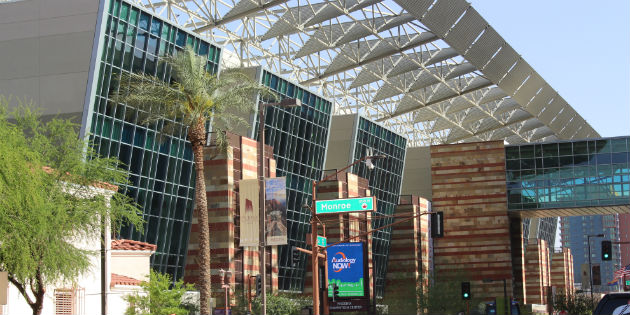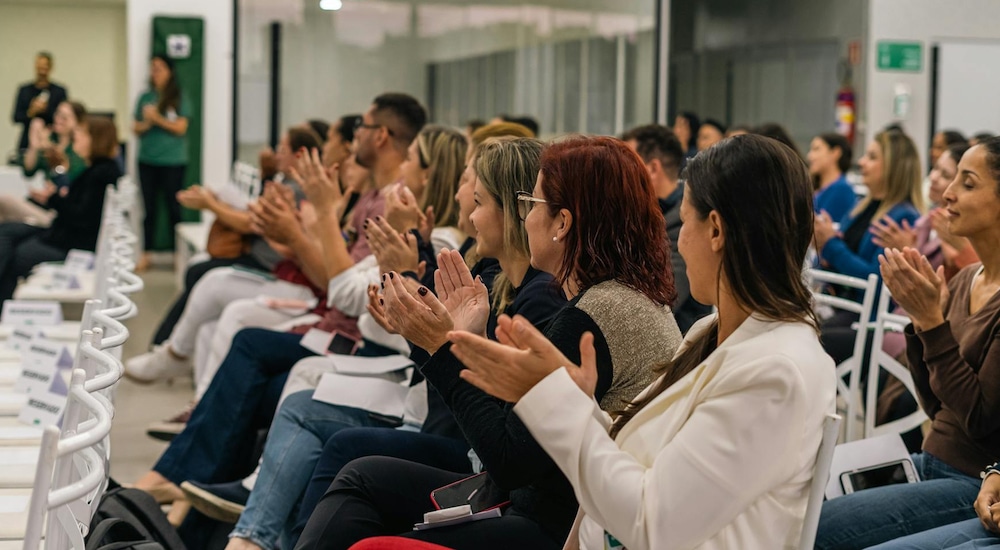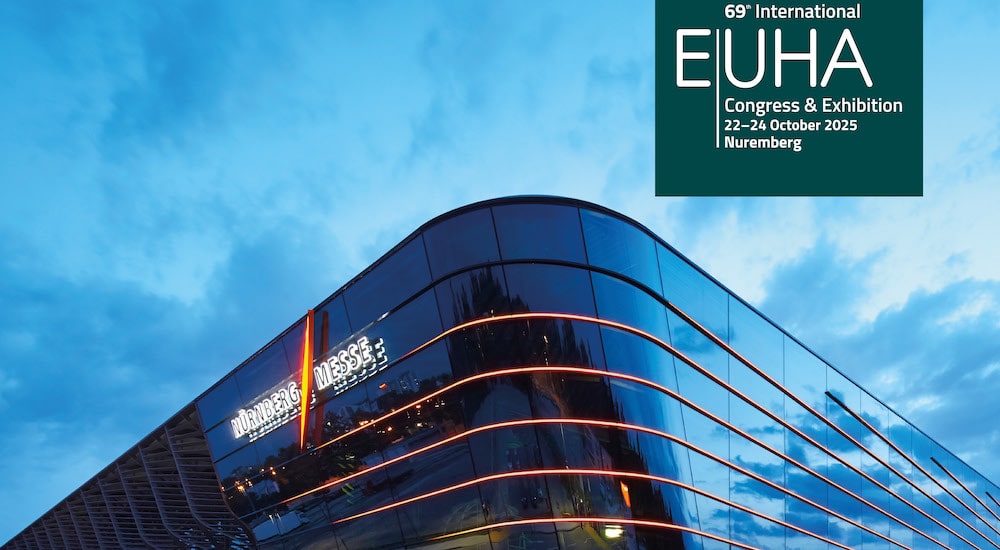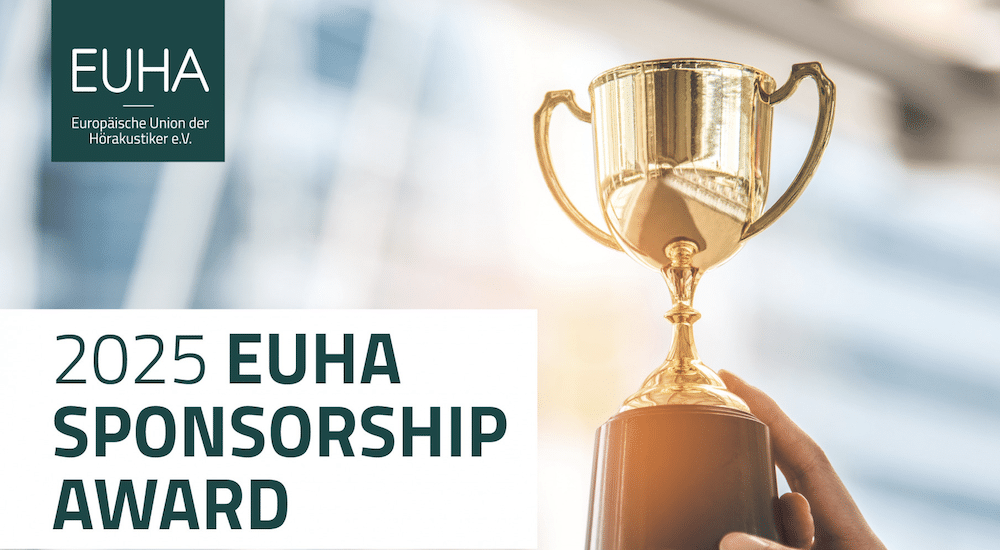Audiology in the desert: what's hot in 2016?
AUDIOLOGYNOW!
A walk round the exhibition hall at this year’s AudiologyNOW! – the annual congress of the American Academy of Audiology – shows what is to come from the suppliers in the hearing industry.

As well as presenting their technological innovations, manufacturers also shared their perspectives on what we can expect over the next twelve months.
The 2016 AudiologyNOW! conference was in Phoenix, Arizona, and 5,459 hearing healthcare professionals came to the capital of the Grand Canyon State (33% of the attendees were exhibitors). The 28th annual conference of the American Academy of Audiology ran from Wednesday 13th April until Saturday 16; offering four days of education, technology, networking, sunshine and a little bit of fun!
Each year, the conference evolves as a new programme committee endeavours to keep the conference fresh. There were several new innovations to the programme, one of which was the ’Industry Symposia’, which took place on the first day. Three companies held three-hour sessions that provided a deeper look into the latest products, services, and technology developments in the field. Care Credit in conjunction with the Hearing Review magazine hosted a session entitled “Aligning Pricing and Services with the Patient Path to Purchase,” ReSound’s session was about “Bringing Smart Hearing Aids to Your Practice and Patients,” and Starkey’s session looked at “Uncovering New Realities in Hearing and Hearing Science.”


This year there were approximately 170 exhibitors in the Phoenix Convention Centre, highlighting their latest research and technology, new products, and services in hearing health care, as well as quick solutions and industry update educational sessions. The two hours of ‘Celebrate Audiology’ (the opening night party in the exhibition hall) was definitely the busiest time in the exhibit hall. The next two days were noticeably quieter with the Friday being particularly sparse of people in the halls.

There were noticeably fewer of the major international suppliers in attendance. Following the withdrawal of Starkey from the exhibition a couple of years ago, more companies have now departed the floor. GN ReSound, Unitron, Bernafon, Cochlear and Advanced Bionics are some of the higher profile companies who chose not to exhibit. Just because they do not have exhibition booths does not mean manufacturers have pulled out completely, several were keen to highlight their involvement in the scientific programme and they still provide financial sponsorship to the Academy.

Most manufacturers had representatives at the congress, so Audio Infos was still able to speak to the major players about the latest innovations and the trends they see that will shape the future of Audiology. Connectivity remains the number one focus, with hearables, music and batteries/power sources also in the mix for 2016/2017. Here’s what some of them said.
Oticon
The talk of the exhibition space was Oticon, as they launched a new platform and product family. The Danish manufacturer asked audiologists to consider a new approach to understanding speech in noise. The press release said, “Speed, power and connectivity open up the world for the end-user,” it continued, “Technological limitations of current hearing aids have led to the use of tunnel directionality: speech coming from the front is clear, whereas the rest of the sound environment is suppressed.” In the press conference, Søren Nielsen, President of Oticon, explained what happens with Oticon Opn, “We go the total opposite route of what has been done in the past 20 years…we do the exact opposite from now on. We open up and let everything in.” There must have been some puzzled faces in the room as he continued, “Intuitively, that sounds totally wrong, that should not be possible. We have made it possible through new, ground-breaking technology that I will share with you.”

Inside the Oticon Opn is a new platform called Velox which Oticon say, “Enables a paradigm shift in hearing care.” The speed of the chip and a very high resolution means ‘OpenSound Navigator’ in the hearing instrument can remove noise across a high number of frequency bands and this way “Can remove noise all around the user without removing any of the information such as speech sources,” Nielsen explained. Processing data 50 times faster than previous Oticon chips, doing full environment analysis more than 100 times per second across 64 frequency channels, the Velox chip in the Opn product has the capacity to handle more than 1,200 million operations per second.
There are multiple microphones in the products but they are used differently. “They are still used to figure out where the sound is coming from, but we don’t use them to take things away,” Nielsen said. “We use them to find out where the noise sources are; we use them as input to the processor but we never create a narrow beam form. We use it to illuminate noise. The entire system is very dependent on all the microphones but they are never used as a directional system.” So how does it enhance the speech? “It takes out noise between words in the frequency channels. It just leaves enough noise around you that you can cope with all the speech, it never removes the speech. So it’s a real noise remover. It’s so fast and so narrow that it can remove it in-between words.”

Asked how he thought the market would react to this change, Nielsen said, “I think they are going to react a lot like you do ‘can this really be true?’ It is true. It is a totally new system, a totally new approach to signal processing.”
Oticon Opn also has a TwinLink communication system with near-field binaural communication for binaural information exchange and 2.4GHz for connectivity to smartphones. And then they take it one step further. “We have made Oticon Opn an internet-connected product through the internet service IFTTT (IF This Then That).” This allows the hearing aid endless connectivity possibilities – your car, kitchen devices, smart devices, anything on the IFTTT network!
Oticon Opn will be launched as a premium product in RiC form factor and will be introduced across international markets towards the end of quarter two (June), “I believe it will actually take people some time to get their heads around this. We have talked directionality and the benefits of that for 20 years and I expect it will take a decent amount of time discussing this with customers,” Søren Nielsen said.
Phonak
The Swiss manufacturer won Best in Show for their booth in the exhibit hall. Those visiting the exhibit were able to see the latest additions to the Phonak product family: Sky V and Naída V.
“Sky V and Naída V complete our successful Venture platform,” said Martin Grieder, Vice President of Phonak. “This platform launched AutoSense OS, which is really focussed on hearing performance. It’s a system that monitors the environment and seamlessly adjusts to over 200 potential hearing situations, to optimise hearing performance,” Grieder explained.

Naída V is a new generation of Naída hearing instruments for users with severe to profound hearing loss. Grieder said, “With Naida V, the key innovation is SoundRecover2. People with severe to profound hearing loss have a hard time listening to high frequencies; this [SoundRecover2] is a frequency compression programme that really focusses on making those sounds heard.” Naída V is available now across all markets in four performance levels and in three models – RiC, SP and UP.
Another area that Phonak has always been strong in is paediatrics. At AudiologyNOW! they released a new paediatric product, Sky V. Because “A child is not a small adult; they need specific hearing aids,” Phonak has “taken AutoSense OS and created a specific programme for children.” Children spend a lot of time in noise playgrounds and classrooms so AutoSense Sky OS has been specifically designed to ensure that kids and teens have an optimal listening experience in their unique listening situations. For example, the dedicated paediatric classifier leads to greater comfort in the presence of loud speech and yelling, as compared to the AutoSense for adult system. “In those areas we can increase hearing understanding by 30% thanks to these specific programmes,” Grieder said.

A third addition to the Phonak portfolio is the Roger table mic. Grieder highlighted three key points of the new product: “It is a table mic that allows connection to multiple Roger microphones, so it works perfectly in a meeting setting with 20 or 30 people. Secondly, there is a very long battery lifetime of up to 20 hours. Thirdly, we put a lot of effort on design that we actually won a Red Dot award for the design of the Roger table mic.”
Talking about the year ahead, Grieder said, “There are a couple of trends affecting the industry that from my perspective are nice opportunities. One trend is demographics where the baby boomers are now retiring and this gives a nice underlying growth to the industry.
“The second one is the whole digital transformation, that gets a lot more interesting; the internet of things. As the hearing aids now become connected, it opens up a whole area of opportunity to provide e-solutions where the consumer and customer touchpoints will change. You can think of distant remote fittings, e-coach, e-assessment; you can really change the way the customer interacts with our customers and us. That is very exciting.”
Widex
The focus for Widex on their large, black exhibition booth was the Unique product family. Jesper Ahlmann Funding Andersen, Senior Vice President of Global Sales & Marketing, told Audio Infos, “We launched the Unique family of hearing aids back at EUHA 2015, and that has been a fantastic success. Now we are adding to that with the combination of new form factors and other functionalities. For instance we are launching a mini-BTE called Fashion mini which has all the great sound qualities of the Unique chip inside but in a very sleek, nice, small BTE form factor.” The Danish manufacturer has also added a CROS range of product on the Unique platform, Andersen said, “We will expand that further in the coming months.”

Widex are one of a few companies seeking alternative power sources. Andersen explained, “We are starting to talk about a very important product in terms of how we power our product – the fuel cell. This is not something we sell right now, it is in the future. It is an alternative to batteries. Batteries are fine but there are dexterity issues with batteries and there is also the environmental aspect of them. So the fuel cell is basically a totally new way of powering a hearing aid. It’s a project we are cooperating with external partners on developing but it is basically a hearing aid without batteries that will come in a couple of years.”
From a business perspective, Andersen said Widex had a “Fantastic year” in 2015 and he expects this to continue thorough 2016 as, “We are getting more products faster to market, we have more regular launches of new form factors, new functionalities, new apps and DEXs. We will have a lot of things going on and we forecast a fantastic year. We actually do believe we are the guys growing the fastest in the industry right now.” Andersen also sees connectivity as the main trend for the next year or so, “Of course, direct connectivity is with us all…and now all the big manufacturers move into that, which does make sense. In Widex, we do strongly believe still that the essence of the hearing aid is fantastic sound and we are strong there but we will also move into the connectivity world and also power sources. When you talk about trends, I think one of the trends you will see is connectivity.”
Signia, a Sivantos brand
Anyone looking for a Sivantos exhibition stand may have been slightly confused as the German hearing aid manufacturer chose to unveil their new Signia brand as the main branding on their booth. Erika Weigmann, Press Officer for Sivantos GmbH, explained, “Our Company is Sivantos and we have several brands. Our new premium brand is Signia.” Under dual branding of Signia and Siemens, the company also launched a new product family – primax.

According to Signia, primax delivers two clinically-proven world firsts – better than normal hearing in challenging listening environments like busy restaurants and clinically-proven reduced listening effort all day. The primax hearing instruments are available as RICS, BTEs, and custom hearing instruments and the Signia products are the only ones that offer built-in rechargeability – change batteries yearly instead of weekly! Some highlights of the products include: primax SpeechMaster which enhances speech in every listening situation by isolating the target speaker from unwanted surrounding noise and other speech, automatically throughout the day. HD Music maximizes enjoyment for music lovers and musicians. EchoShield softens reflected sound for better sound quality and reduced listening effort in places where there is high reverberation – atriums, lecture halls and places of worship. TwinPhone enables the wearer to hear a phone call in both ears for better understanding.

Roland Heichel, Head of Corporate Product Marketing, said, “primax is built on the success we had with binax and we add even further components like SpeechMaster which makes the listening and understanding easier for the users of the instruments. We added a new component to the directionality as we now look at the loudness of the direction. In a noisy environment when we talk with each other, then the target speaker is usually the loudest one and the competing speaker is usually softer. We detect this now and work the target speaker more precisely and soften down the competing speaker.” Weigmann was keen to highlight the music programme, “We have always been seen as very good at transmitting music and with primax we go a step further. We have three music programmes; one for if you want to enjoy live music at a concert, pop, rock, classical; a second programme for at home to listen to music and a third one for if you are on stage yourself as a singer or musician.”
Signia also see connectivity as the main trend, Heichel said, “Direct streaming is coming to more and more devices, this is the trend. This whole connectivity thing will become more and more the future as we reach the borders of what can be done with audiology. Every company is looking at how to differentiate; there will be other things in the future.”
Who wasn’t exhibiting?
For the fourth year, Starkey was missing from the exhibit floor, but they were still very much in attendance at the congress. Presentations throughout the main lecture programme, platinum sponsorship and an afternoon symposium on the first day ensured they had a visible presence. Their industry symposia provided a snapshot of some of the main Starkey presentations from their Hearing Expo that took place in January.

Presenters included Brandon Sawalich, who told the audience, “We brought our A-team for you.” Tim Trine, Dr Dave Fabry, Carol Olson, Kate Simek and Chris McCormack all took part in a series of ‘spark talks’ covering hearing aid technology, marketing and branding and what to expect from the Starkey partnership with Bragi. We can expect the two companies to be technology sharing, which will result in ancillary revenue for the hearing care professional offering custom Bragi products with the Starkey sound. Starkey expect the products to help with stigma reduction and to increase brand awareness for Starkey Hearing Technologies. Finally, Sara Burdak introduced audiologists to the new Starkey products: Muse, SoundLens [Synergy] and Halo2.
For the first time at AudiologyNOW! GN ReSound chose not to exhibit. Anders Hedergaard, CEO for ReSound, explained, “We are concentrating on a symposium and a lot meetings and activities going on with local audiologists and students. We are participating in the scientific part of the conference. We saw that the exhibition stand was not the vehicle to get the right contact. So we are spending our energy and sponsorship to the Academy in a completely different way, but we are still very committed to the field, we just do it where it makes sense.”

Like Starkey, GN ReSound provided one of the industry symposia on the first day of conference, “The focus there has been to highlight that we, overtime, have launched a broad product portfolio that meets all the segments, all the form factors with a broad range of connectivity. We have built into that a super sound quality – that’s natural hearing. That was very much the focus yesterday,” said Hedergaard. In the coming year GN ReSound will be focussing on smarter fitting with the audiologist at the centre of this, “What we announce is to look at the fitting process: it’s tedious, time-consuming. We believe that if you can make it shorter, more rapid, the audiologist can concentrate on the counselling and getting the conversion between the hearing test and the fitting of a hearing aid and the potential risk of a return rate that sometimes is pretty high, that we can get that improved.” Hedergaard also expects GN to grow more than the market this year, a repeat of their performance last year that witnessed a 9% growth for ReSound against a total market growth of 4-5%. “I think it is a highly competitive industry but I think the world of connectivity will remain being an issue going forward. And here I am very happy that we have a strong foothold,” Hedergaard concluded.
For the first time, Unitron did not have an exhibition stand. They had a meeting room for customers and Unitron representatives from the US office and a few from head office in Canada. One of those in attendance was Andre de Goeij, Director of Product Management and Product Marketing who was keen to talk about the latest developments from Unitron. Just before AudiologyNOW!, Unitron announced they had received a Red Dot award for the product they launched at the 2015 EUHA event – Stride P – and now they were releasing “It’s little brother, Stride M” which is a slimtube, 312 BTE offering the highest gain and output. Stride M is from the North product line so includes features such as SpeechZone 2, SoundNav and Sound Conductor. Stride M is wireless and has a telecoil for those who need it. “Stride M is Unitron’s smallest BTE, but still manages to provide the highest output of any 312 BTE in the industry, making it suitable for patients with a wide range of hearing losses, or who for a variety of reasons can’t wear a receiver-in-the-canal (RIC),” said André de Goeij.

De Goeij was also keen to talk about the patient insights that Unitron offer. The first part of this ― Log It All ―was launched at EUHA and now the company has added Patient Ratings. Log It All captures objective data from the hearing instrument on the patient’s real-life hearing experiences across seven unique sound environments, while Patient Ratings provides the practitioner with subjective in-the-moment insights into a patient’s perception of their hearing experience. This information can be logged in the cloud and fitters can see this information prior to their client returning to the practice. De Goeij said, “This is what we mean by in-clinic success. We create tools not because they are cool but because they have an application in your clinic which means you can do your job better.”
Once again Bernafon did not have an exhibition booth, however, their sister company Sonic were there. The Sonic team showed Celebrate, Cheer and Journey, three products built on Sonic’s Variable Processing Platform. Celebrate is the premium range that prioritises speech frequencies, Cheer is the mid-to entry-level range with Phoneme focus and Journey is for severe to profound users. “This is the most comprehensive portfolio of advanced technology solutions that Sonic has ever offered,” said Joseph A. Lugara, Sonic President & Chief Operating Officer. “It is a one-stop destination for hearing solutions that make everyday sounds better for people no matter what their day-to-day situations or hearing needs are.”
Along with the connectivity trend and hearables, the talk of the exhibit hall was the level of attendance at the event. Firstly, the decreasing numbers of the major manufacturers and their different brands exhibiting and also the seemingly lower number of people in the exhibition space. The Celebrate Audiology event on the first evening was well attended but numbers were much lower on the Thursday and Friday. Asked to comment about the declining numbers, an Academy spokesperson said, “The American Academy of Audiology is focused on mission-driven initiatives with support from our industry partners. As such, we have expanded our engagement with industry through the new Corporate Partner Program. While industry continues to be involved with AudiologyNOW!, the Academy continues to explore new ways for industry to partner with the Academy to support our mission and goals.” With the amount of money spent by industry suppliers, you have to wonder what is going to happen with this congress in the future. Next year’s event takes place in Indianapolis, Indiana, from 5th to 8th April.
We took advantage of AudiologyNOW! to ask hearing aid manufacturers about the hearables’ trend. Read here what some of them had to say.
Flip through our AudiologyNOW! special issue.
Photos: V.A.


